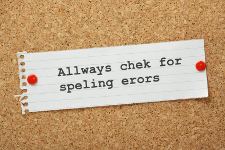
©iStock.com/Thinglass
Studies show that crisp, concise writing that gets the point across quickly is the most effective.
For online writing, efficient copy is even more important. Most readers scan online posts and articles before they decide to read them.
Yet, many writers make careless mistakes. You can’t count on your spell checker to catch everything. Do you make these five careless blunders?
If you liked this post, you may also like Tighten Your Web Writing in 6 Easy Steps.
Blunder #1. Wordiness
Is your writing full of extra words and phrases that don’t add anything to your message?
Many writers make this blunder without even realizing it. Wordiness is hard to notice in your own writing. Spell check software won’t mark extra words and phrases because they aren’t technically wrong.
Yet, wordiness can dilute your message.
If you think you have this problem, review Shanna Mellon’s list of 10 More Words to Cut from Your Writing.
Blunder #2. Wrong Word Usage
Word usage mistakes are often missed by spell check software and in self-proofreading.
There are two main reasons for word usage mistakes:
- Misunderstood words. If you don’t understand the meaning of a word, you can’t use it correctly. Check this list of 25 Common Words That You’ve Got Wrong by Joseph Hindy on Lifehack. Did you notice a few words you’ve been misusing? You’re not alone.
- Similar words. Some words sound the same, but have different meanings (and spellings). For example, consider the words “their,” “they’re,” and “there.” All three words sound almost exactly the same, but have completely different meanings. It’s easy to type one of these words, when you mean to use the other.
Make sure that you know the meaning of the words you use. Always check to make sure you are using the correct word.
Blunder #3. Misspellings.
Correct spelling is important. As I’ve discussed before, misspelling can make your writing seem sloppy and unprofessional.
Running your spell checker will cut back on misspellings. (And having a misspelled word in your copy can signal to readers that you don’t care enough to check your spelling.)
There is one type of misspelled word that spell check software won’t catch–the misspelled name. Whether it’s a personal name, a product name, or the name of a place–a misspelled name is one of the most embarrassing spelling mistakes you can make.
Nobody likes to see see their name misspelled. Always double check the spelling of names in your copy.
Blunder #4. Passive Voice
While it’s not always wrong to use passive voice, using too much passive voice can make your writing seem wishy-washy. That’s because passive voice often leaves a question as to who is performing the action in the sentence. Passive voice also tends to be wordier.
To find passive voice in your copy, look for:
- Sentences where the subject comes after the verb.
- Forms of the verb “be.”
To illustrate, here’s an example of passive and active voice:
Passive: The book was read by her.
Active: She read the book.
Blunder #5. No Formatting
I’ve seen even experienced writers make this mistake when publishing online. It’s especially common with academic or technical writers.
Online copy needs to be scannable. That means a reader should be able to skim through it quickly and get the main points.
One of the best ways to make your articles and posts scannable is by using formatting. Some examples include:
- Lists (bulleted and numbered)
- Subheads
- Bold or italic type
- Callouts
- Captions on images
Your Turn
Did I miss any writing blunders? Add them below in the comments.

4 responses so far ↓
1 Margaret Desjardins // Sep 19, 2014 at
Add punctuation problems to that list which makes communication unclear. Run-ons, fragments,and particularly the pesky comma splice problem irritate literate people and confuse the message. Dr. D., Written Comp Prof for 25 years
2 Laura Spencer // Sep 20, 2014 at
Hi Margaret,
Thanks for stopping by and adding to the list. 🙂
3 Luke Sprague, M.A. // Sep 23, 2014 at
Laura,
Nice post. I think how you deal with each of these issues depends on your audience. For instance, if I am talking to a public versus academic audience I might simplify my sentence structure, reduce complex word usage, and break apart sophisticated thinking.
So, I think, audience, audience, audience, it makes all the difference in the world.
Luke
4 Laura Spencer // Sep 23, 2014 at
Thanks Luke!
Good point about considering your audience. That’s very important. In fact, I have another post on that topic. 🙂
However, writers need to be careful about some of these regardless of who their audience is. For example, it’s never a good idea to turn a piece in that has spelling errors or words that are used incorrectly.